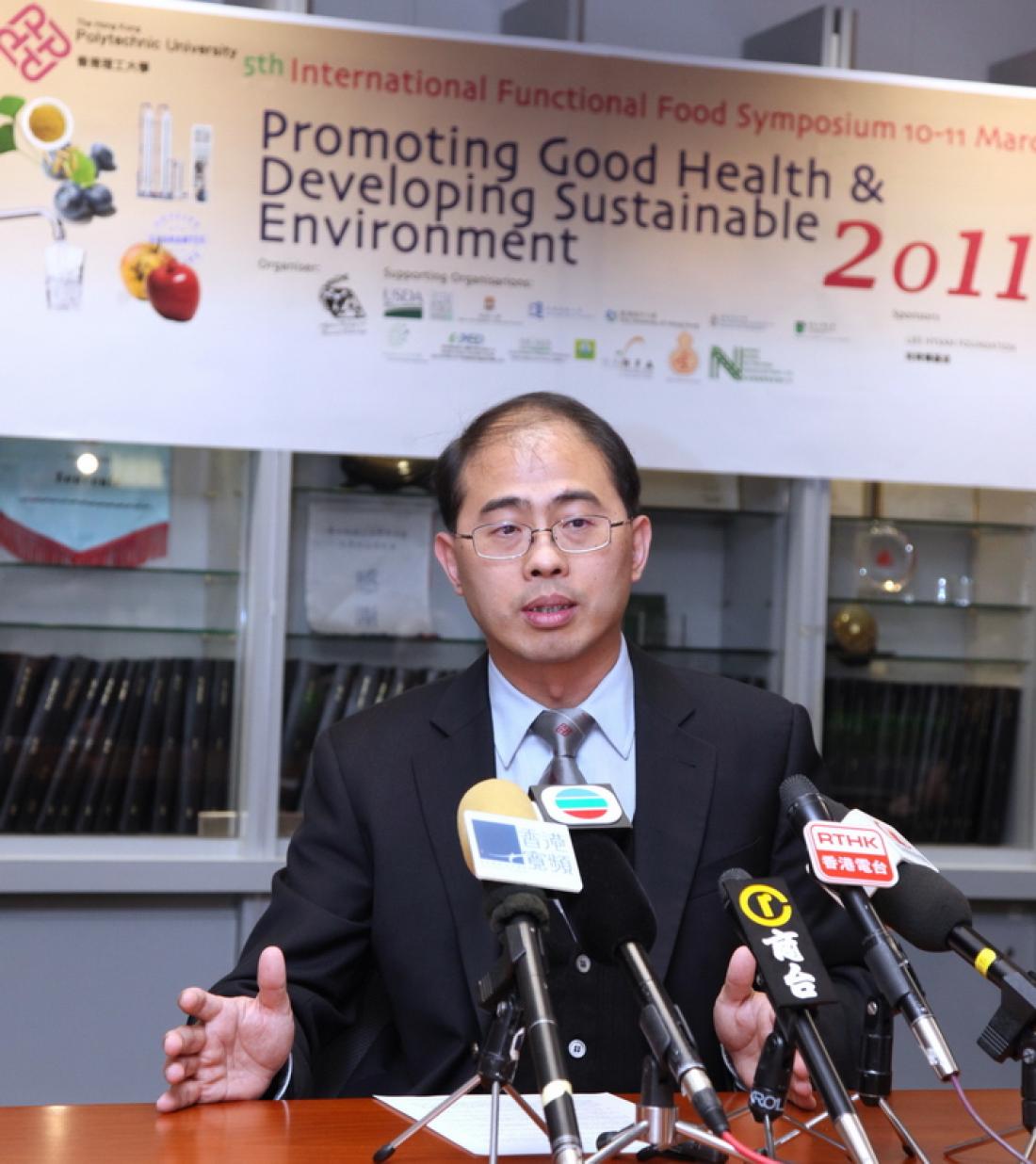The two-day event will bring together about 400 participants from eight countries and territories to present the latest research findings related to traditional Chinese medicine and foods and also on water and environment. It will be opened on 10 March by Professor Wong Kwok-yin, Dean of PolyU’s Faculty of Applied Science and Textiles.
Speaking at the Press Conference on the Symposium, Professor Wong Wing-tak, Chair Professor and Head of PolyU’s Department of Applied Biology and Chemical Technology, said Hong Kong’s first Food Safety and Technology Research Centre run by a University would be established on the campus of PolyU this year. He said the new Centre is expected to raise the standard of food safety and related testing and certification. The Centre will be actively engaged in food science research and provide training and consultancy service.
The Symposium will be grouped into four sessions, namely Food Safety, Health Foods (Functional Food, Supplements, Nutraceuticals) and Traditional Chinese Medicine (TCM), Water Purification, Environment and Water Resources. These areas are expected to be of interest to researchers as well as industrialists, policy makers and regulators, food suppliers, etc.
Many leading experts and academics will present their research findings at the Symposium. The keynote speakers include Professor Claude Fischler from École des hautes études en sciences sociales, Paris; Dr Lawrence HY Lee, former Director of Agriculture and Fisheries Department; Professor K. C. Ho from Open University of Hong Kong, and many senior researchers of PolyU, including Professor Samuel Lo and Dr Gilbert Chan from the Department of Applied Biology and Chemical Technology.
The first day of the Symposium will be devoted to Safety: improving food safety by using natural oils from plants (with experience sharing by experts from the US Department of Agriculture), discussing the safety or usefulness of “Health Foods” a.k.a. nutraceuticals, supplements, functional foods (by Professor Georges M. Halpern and Dr Albert Wong), and safety issues in TCM marketing (by Dr Alexander Leung of the Hong Kong Baptist University). Dr Lawrence HY Lee, former Director of Agriculture and Fisheries Department, will also give a keynote address during the first day.
The second day of the Symposium will address Water: water purification (by Professor P. K. Wong of The Chinese University of Hong Kong and Dr Gilbert Chan of PolyU), and a major session on environment and water resources (by Professor Laurie H. M. Chan of the University of Northern British Columbia and Professor Kenneth Leung of The University of Hong Kong).
Professor K.C. Ho of the Open University of Hong Kong will speak on mitigating harmful algae and water purification in the morning session on the second day. On PolyU side, Professor Samuel Lo will speak on the chronic exposure to mercury and its impact on the brains; and Dr Gilbert Chan on the advanced applications of ozone in different settings.
In studying the chronic exposure of rats to low dosage of methyl-mercury, an environmental contaminant commonly found in seafood, Professor Samuel Lo and his team concluded that the cerebellum accumulated the highest amount of mercury, followed by the visual cortex, then the motor cortex and somatosensory cortex. The study also found that apart from methyl-mercury, the brain also accumulated other forms of mercury. In cases of acute mercury poisoning as seen in Minamata disease, the neuro-sensory pathway seems to be affected first. Hence the PolyU team studied protein expression in the somatosensory cortices of rats intoxicated with low-dose methyl-mercury using advanced proteomic techniques. They found that expression of 104 out of 973 proteins was decreased by at least 50% after exposure to mercury contaminants.
Among these down-regulated proteins, 18% were related to cytoskeleton, 26% related to energy metabolism, 18% related to protein metabolism and 20% related to neurotransmitter release and signal transduction. The combined effects of these down-regulated proteins will suppress normal neuronal functions enormously, including the ability to repair itself. This inevitably transcribed to mean that chronic exposure of low dose methyl-mercury may increase the risk of having neurodegenerative diseases.
This fifth edition of the Symposium is deliberately focusing on and exploring in depth issues that already affect and will affect Hong Kong, China and the planet. Public health issues are of concern, as well as the environment, water resources and management, and the honest information and education of the general population. The overwhelming commercial intrusion in these areas is a challenge, and the speakers will try to separate the truth from the hype –or the lies.
Concurrent with the Symposium will be a Poster Session organized by young researchers, during which they will present and promote their research projects to participants.
The fifth Functional Food Symposium is supported by Hong Kong Dieticians Associations;
International Life Enhancement and Chinese Food Therapy Association; Lee Hysan Foundation; Modernized Chinese Medicine International Association; The Hong Kong Food Science and Technology Association; The Hong Kong Jockey Club Institute of Chinese Medicine Ltd; The Hong Kong Health Food Association; The Hong Kong Nutrition Association; The Hong Kong Science and Technology Parks; and the US Department of Agriculture. It is also supported by many local universities, including City University of Hong Kong; Hong Kong Baptist University; The Chinese University of Hong Kong; The Hong Kong University of Science and Technology; The Open University of Hong Kong; and The University of Hong Kong.
*****
Press Contact :
Ms Ailsa Yuen / Ms Wai-Yin Pang
Department of Applied Biology and Chemical Technology
Tel: (852) 3400 8694 / (852) 3400 8860
E-mail: bcailsa(at)inet.polyu.edu.hk/ bcyin(at)inet.polyu.edu.hk



